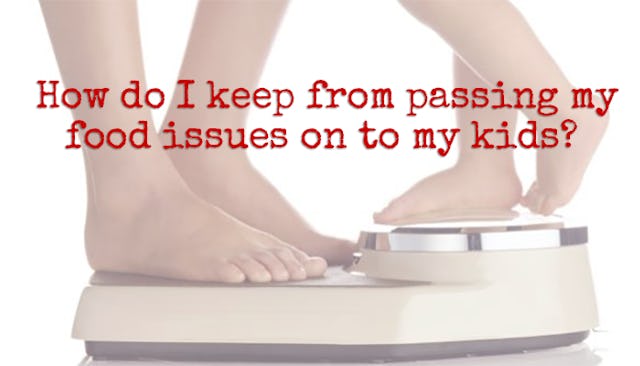How Can I Stop Passing My Food Issues On To To My Kid?

The beautiful and scary paradox of being a mother is that we will profoundly impact our children. While there are many influences that contribute to a child’s development, including genetic makeup, cultural and religious institutions, one of the primary ways children learn to be in the world is through modeling, most often by mimicking the behavior of their parents.
This is especially true with regard to developing a relationship with food. Unfortunately, distorted attitudes about food and body image are so prevalent, they’re pretty much the norm. Almost every woman I know has suffered from some form of disordered eating behavior or poor body image, and runs the risk of passing bad habits onto their kids.
When a mother is dissatisfied with her body, only eats small amounts of food, or certain types of food, it is more likely that her daughter will model this behavior and internalize distorted beliefs about her own body and relationship to food.
Generally, the best way to show your child how to develop a healthy relationship with food is to model it for her. You have to first heal your own distorted relationship with food and body image before you can expect to offer your child a different experience. How can you give them something that you don’t already have?
Improving your own attitude about food and your body is the best way to ensure that your children will feel good about their bodies, whatever size they are. Unfortunately, there is no quick fix for resolving your own issues with food and your body but change is absolutely possible, it just requires a little bit of awareness, honesty, and willingness.
Almost all of our issues with food (or anything else for that matter) can be traced back to faulty, dysfunctional belief systems. Your beliefs, whether conscious or unconscious, determine your feelings and behaviors. Change your beliefs, and your feelings and behaviors will be altered. Hold on to the same beliefs, and your feelings and behaviors will stay the same. However, most of our beliefs were formed in our own childhood as a way to make sense of the world, and are surprisingly unconscious. In order to heal yourself in this area, you must first become aware and honest with yourself about the underlying beliefs you may hold about food, weight, body image, etc.
Once you are aware of what exactly you are working with, you must then be willing to change those faulty beliefs and adopt more healthy, balanced beliefs around food and your body. This can seem like an incredibly daunting task, and the truth is change is hard. Really hard. It takes commitment, discipline, persistence, and patience, all of which are challenging but may seem next to impossible for mom’s who struggle to even find time (or space) to squeeze in a shower on a daily basis! But it’s amazing the strength and courage we are able to muster up when it comes to our children. On our own we may not be able to put in the work to heal these areas of ourselves but when our children are depending on us, and it’s no longer just us that have to feel the pain of it we make sure we do everything we can so that they don’t have to repeat our painful mistakes.
While this may seem like a massive undertaking, there are baby steps you can take today to change your behavior around food and your body, especially when the kids are watching:
Stop griping about being fat, complaining about your weight, or sharing information about the new diet you are trying.
Try to avoid that once over and eye roll you do every time you pass a mirror or window, even if you think you’re being discreet about it.
Get in the pool with your kids, modeling for them comfort in your own body, whatever its size.
Take a bite of the cookie your child offers you, even though you’ve sworn off carbs and sugar this week.
Say “No thank you, Mommy’s tummy is full” to the cookie your child offers you after you’ve already had 3.
The point is, learn what a healthy relationship with food looks like and DO THAT. Even if your underlying beliefs don’t yet lineup you can still be doing the work to change your behavior. Just remember that the long-term, lasting change you want will come from shifting your internal experience.
Of course, if a child does develop a distorted relationship with food and body image, it’s not always her mother’s fault! Again, there are many other factors that influence development, and culture, genes, and brain chemicals can all contribute to raising an eating disordered child, in spite of a mother’s best efforts to instill her with positive body image. But there is no denying that mothers can have enormous influence over how a daughter perceives and relates to her body.
The bottom line is that you need to be stable for your children. That is going to be the best way to prevent passing on your own struggles. Think of it like you’re on an airplane. What do they always tell you to do in the event of an emergency? You must put on your own oxygen mask first, before attending to your children. Why? Because a parent who can’t breathe cannot effectively help their child.
This article was originally published on